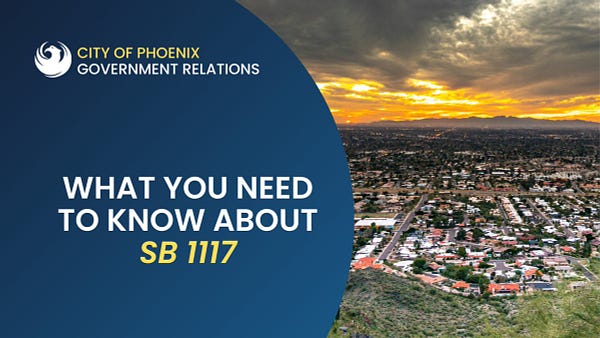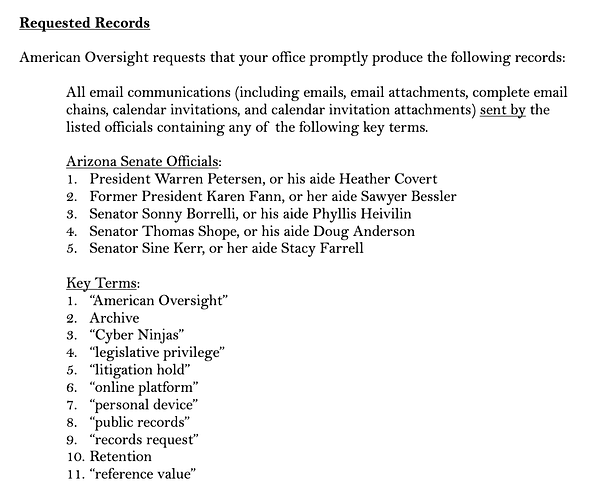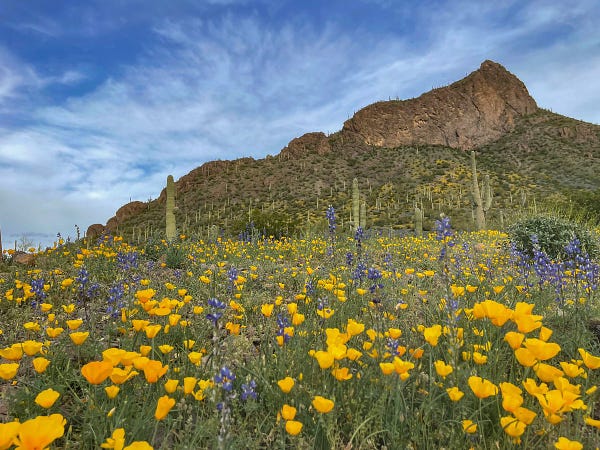The Daily Agenda: Housing crisis to continue
The rent will likely remain too damn high ... We won't be drinking Nestlé creamer anymore ... And Swift City is Arizona's sixth-largest city.
A bipartisan band of state senators yesterday shot down the main bill aimed at solving Arizona’s ongoing housing crisis, quashing the best chance lawmakers have at attacking the issue this year.
Senate Bill 1117 offered a smorgasbord of potential solutions to Arizona’s housing problem and was the result of months of negotiations between the many bitterly opposed factions of Arizona’s housing industry. While many provisions of the bill were Republican supply-side or deregulatory solutions to the problem, the bill was the product of compromise and included many ideas that progressives support.
Among its host of provisions, the bill would:
require big cities to allow smaller lot sizes in areas zoned for single families.
speed up rezoning applications and building permits.
require cities to allow duplexes and triplexes.
allow people to build accessory dwelling units (basically guest houses) and ban them from being used as short-term rentals.
require cities to conduct a housing needs assessment and come up with a plan for satisfying those needs.
Republican Sen. Steve Kaiser led a housing study committee that traveled the state seeking input from residents last year before crafting SB1117. He has doggedly attempted to balance meaningful reform with wrangling deep-pocketed housing special interests. His effort to hear out all sides earned him one of the more diverse lists of backers we’ve seen recently and no shortage of praise from his colleagues. Democrats even gave Kaiser props for his willingness to “walk into the lion’s den” and meet with their caucus. It ultimately did not net him the 16 votes necessary for the bill to clear the Senate, even after multiple revisions and concessions.
“We have to have the political courage to stand up to certain groups, certain special interest groups, and say no. This bill… is going to be the vehicle that helps solve a lot of these problems,” Kaiser told his colleagues, to no avail.
In the end, SB1117 died1 because it ran afoul of one of he most powerful interest groups at the Capitol: cities and towns. With 91 mayors and many more city council members among its ranks, the League of Arizona Cities and Towns, which lobbies on behalf of cities, brought the full force of its bill-killing machine down upon SB1117. All but one Democrat joined with a smattering of Republicans in opposing it. Ultimately, the plan crafted after a year of painstaking negotiations failed with only nine supporters in the Senate.


The League had many points of opposition to the bill, but its arguments basically boil down to two things: The bill attacks local control, including a local community’s ability to thoughtfully plan and plot a city’s design and ensure compatible land use, and the bill only ensures more houses, not more affordable housing.
But more broadly, cities don’t actually believe they’re the problem. Proponents of the bill have done a good job setting the narrative that the main factor behind Arizona’s housing crisis is city zoning and regulation issues, according to Rene Guillen, deputy director of the League. And while he agrees those issues are a factor, he argued local zoning regulations are just a small part of the problem.
In an attempt to show that cities aren’t dodging responsibility or opposing all attempts to solve the housing crisis, the League has its own “alternative plan” that would require cities to choose three options from a menu of options to increase affordable housing, a policy it first floated last year and has since tweaked, though it has failed to catch on at the Capitol this year. But cities could satisfy the requirements of that proposal with pretty minimal effort, likely bringing similarly minimal relief to residents.

We won’t pretend to know who exactly bears what share of the blame for Arizona’s housing crisis or which bill would do a better job of improving the situation. Neither proposal alone is going to solve the problem.
But the fact that neither bill seems likely to pass is not good news for anyone.
Going international: Gov. Katie Hobbs went to Oman yesterday to commemorate a new military partnership between the Arizona National Guard and the Sultanate of Oman. Hobbs will be in Oman until Wednesday, making Secretary of State Adrian Fontes acting governor.
Crackdown incoming?: Fontes may try to get stricter penalties and actual ramifications for politicians and PACs that don’t follow campaign finance laws, a common problem in Arizona, the Republic’s Ray Stern reports. While state law does allow for fines for missing or incomplete reports, they’re rarely assessed and often reduced. Lawmakers and political committees seemingly know they won’t face consequences, as the Republic found several sitting officials (mostly Democrats) who didn’t fill out their campaign finance or financial disclosure forms correctly or completely.
All this for creamer: Nestlé, the large company that sells tons of food and beverage products, wants to change Arizona law to get enough water to produce a creamer, 12News’ Hunter Bassler reports. The company plans to build a plant in Glendale, but is running into issues getting enough wastewater from a private water company to do so. Now, Nestlé is asking lawmakers to support Senate Bill 1660 and let factories treat water on-site instead of using third-party water providers, which faces strong opposition from cities and water companies because it could threaten the state’s groundwater supply.
It’s everyone’s problem: While the City of Scottsdale has borne most of the criticism for cutting off water to Rio Verde Foothills, there’s plenty of blame to go around, and there were warnings for years that the wildcat subdivision needed to stop relying on the city for water, the Republic’s Sam Kmack reports. Scottsdale has said it needs to protect its water resources for the city’s needs, though in recent years, the city has banked a lot of its water for future use, the Scottsdale Progress’ Tom Scanlon reports.
More water news: An “informal caucus” of senators whose states rely on Colorado River water, including Arizona’s U.S. Sens. Kyrsten Sinema and Mark Kelly, are trying to work on negotiations to cut water usage in their states as federal cuts loom, KUNC’s Alex Hager reports. Kelly, for his part, told KTAR he won’t let water levels get so low that water can’t be released because the consequences would be too great, though the details of how to keep water in Lake Mead are where negotiations falter. Meanwhile, lawmakers in Nevada could allow Las Vegas to further restrict residential water uses in the city, where lawns are already banned, pool sizes are limited and residential water is recycled, the Associated Press reports.
Public laws represented by private orgs: A federal judge will allow Arizona’s Republican legislative leaders to defend a 2021 law that bans abortions for fetal abnormalities, Capitol Media Services’ Howie Fischer reports. Democratic Attorney General Kris Mayes said she wouldn’t use her office to defend the law, so Senate President Warren Petersen and House Speaker Ben Toma will instead defend it, backed by the conservative Alliance Defending Freedom.


New situation, new law: After increasing high-speed chases between law enforcement and human smugglers near the U.S.-Mexico border, a new Arizona law makes it easier for smugglers to be charged, the Republic’s Rafael Carranza reports. The law, which went into effect in September 2022, allows for charges if a smuggler attempts to hide the people they’re transporting and creates mandatory prison time for attempted smuggling.
Just smoke regular weed: Delta-8, a hemp-derived product, can get you high, and it’s perfectly legal. But it’s not regulated, meaning children can buy it, it’s not taxed and there are no safety measures in place for its use, unlike legalized marijuana, the Republic’s Ryan Randazzo reports. The marijuana industry wants delta-8 off the market, but a bill that would’ve killed the delta-8 industry didn’t get enough votes this year, while a bill to limit it to people over age 21 is still in play.
New job alert: Do you want to run elections in Cochise County? The last elections director, Lisa Marra, left the job because of a hostile work environment perpetuated by county supervisors who sought a hand count of ballots and resisted certifying the 2022 elections. Your boss would be County Recorder/interim elections director David Stevens, an election skeptic. The position pays up to $91,000, the Herald/Review’s Shar Porier reports.
Re-litigating the 2020 election: After Tucker Carlson aired footage of Jacob Chansley, aka the QAnon Shaman, walking through the U.S. Capitol on Jan. 6, 2021, alongside police, prosecutors are pushing back, saying the footage shows only a small window of Chansley’s acts during the insurrection, Politico reports. And the New York Times’ Nate Cohn writes that, while Fox News’ 2020 call for Biden was correct over time, it was made prematurely and based on a likely misunderstanding of Arizona’s remaining votes.
Can’t silence the union: The president of the Chandler Law Enforcement Association, the city’s police union, filed a notice of claim against the city threatening a lawsuit, the Chandler Arizonan’s Ken Sain reports. Michael Collins claims the city retaliated against him because of comments he made as part of his union work advocating for better pay and working conditions.
Keep reading with a 7-day free trial
Subscribe to Arizona Agenda to keep reading this post and get 7 days of free access to the full post archives.









